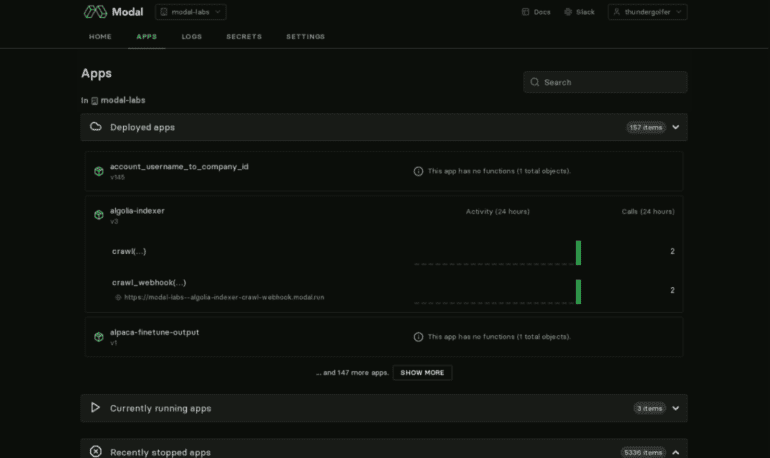TL;DR:
- Modal Labs secures $16 million in Series A funding led by Redpoint Ventures.
- The total funding for Modal Labs now stands at $23 million.
- The investment will primarily be used for expanding the team with a focus on hiring software engineers.
- Founder Erik Bernhardsson, formerly of Spotify and Better.com, aims to address data engineering challenges.
- Modal’s platform enables cloud-based code execution without the need for complex infrastructure configuration.
- Developers can define container images and hardware specs in code and pay for compute power usage.
- The platform offers real-time logs and metrics through an observability dashboard.
- Modal Labs competes with Google Colab in the cloud-based data engineering space.
- Notable clients include Substack and Ramp.
- Modal Labs is generating a monthly revenue in the “six digits.”
Main AI News:
In a significant development for the data-driven business landscape, Modal Labs, a pioneering cloud-based infrastructure provider catering to data teams and app developers, has successfully raised $16 million in a Series A funding round. The funding round was spearheaded by Redpoint Ventures, with additional investments from Amplify Partners, Lux Capital, and Definition Capital. This latest cash infusion has brought Modal’s total funding to an impressive $23 million, underscoring the strong investor confidence in the company’s vision and capabilities.
Modal Labs, founded by Erik Bernhardsson in 2021, is poised to disrupt the conventional paradigms of data engineering tools. Bernhardsson, who brings over 15 years of experience in building and leading data teams, including his tenure at Spotify where he played a pivotal role in developing the music recommendation system, and later as the CTO of fintech firm Better.com, identified a pressing need for advanced infrastructure solutions to tackle the evolving challenges faced by large organizations.
Despite lingering questions about his stint at Better.com, Bernhardsson is resolute in his assertion that he departed from the company well before the controversial layoffs and executive departures. Fueled by his vision, he embarked on a mission to revolutionize the data engineering landscape, eventually giving birth to Modal Labs.
Modal’s innovative platform empowers data teams and engineers to seamlessly execute code in the cloud without the complexities of configuring infrastructure. Leveraging a custom-built container system coded in Rust, Modal can rapidly scale to accommodate hundreds of GPUs within seconds, setting an industry benchmark for efficiency.
Developers can define container images and hardware specifications through code, paying only for the compute power they actively utilize. Furthermore, they benefit from an observability dashboard offering real-time logs and metrics, streamlining the development and deployment process.
Erik Bernhardsson, the CEO of Modal Labs, emphasized, “The increasing demand for AI adoption, particularly in deploying generative AI models on GPUs, highlights the growing significance of data and AI in the software ecosystem. Modal Labs aims to build upon its foundational offering and create a comprehensive tech stack tailored for data teams.“
While Modal is transitioning from its beta phase to full-fledged general availability, it faces competition in the form of Google Colab’s recent enterprise-tier launch. Nevertheless, Modal has already garnered notable clients such as Substack and Ramp, both leveraging the platform for large-scale data projects and AI-driven audio transcription features.
Sources familiar with Modal’s financial performance have indicated that the company is generating monthly revenue in the “six digits,” a promising sign for a burgeoning startup.
Bernhardsson reiterated, “The current array of tools that data teams rely on is fragmented and cumbersome, necessitating the integration of multiple platforms and tools, resulting in productivity losses and increased costs. Modal serves startups in this space by providing a seamless cloud-based code execution environment, eliminating the complexities of managing infrastructure.”
Conclusion:
Modal Labs’ successful funding round highlights the growing demand for streamlined cloud-based data infrastructure, especially in the context of AI applications. This investment positions Modal Labs to further develop and expand its innovative platform, potentially reshaping the data engineering landscape and providing more efficient solutions for data-driven businesses.

